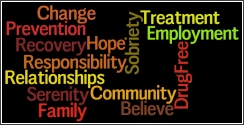 Recovery is for everyone and anyone with a genuine desire for change. Treatment in a methadone program offers the potential for change, and a new path which can lead to a much improved life.
Recovery is for everyone and anyone with a genuine desire for change. Treatment in a methadone program offers the potential for change, and a new path which can lead to a much improved life.
In the field of addiction recovery, there are a multitude of methadone treatment programs all across the country. These programs vary considerably one to another, and this is a result of treatment philosophy, staff experience & qualifications, funding availability, and the underlying structure and operation of the methadone clinic itself.
Some methadone treatment programs are for profit and some are non-profit. Both can deliver high standards of client care and ethical treatment of their clients. "Good" treatment programs are generally identified as being so by their own clients. Conversely, if a particular methadone program is "not so good", their clients will recognize it immediately and the word will get out very quickly.
What makes a "good" methadone program? From most clients' perspectives, it is these things:
- checking-in and receiving their medication in a timely fashion
- being shown courtesy and respect by staff
- feeling like the clinic is staffed by sincere, committed professionals
- being treated as an individual instead of a number
- paying reasonable fees for the service provided
- rules, regulations, and expectations are clear and are enforced fairly
- being heard & supported … when there is a problem
What is a "well run program" from a clinic perspective? These are important …
- has clear policies and operating procedures
- staff are professional, accountable, and self-motivated
- there is a culture of respect & consideration shown for all staff and clients
- costs & expenditures are carefully tracked and managed
- the program of treatment is designed and delivered with integrity
- documentation of services is consistently completed in accordance with standards
- services are funded on a consistent basis (otherwise, the clinic will close)
Methadone treatment, and opioid addiction recovery, are not radically different from other substance abuse treatment programs or models of change. The underlying addictive disorder is fundamentally very similar. What separates opioid addiction from some other addictions is the overwhelming physical dependency that can develop with opioids and the associated withdrawal syndrome.
The cognitive-behavioral changes, and eventual psychological growth, that occur in opioid addiction recovery are exactly the same as in any other addiction recovery path. The essential difference is the utilization of opioid replacement medication to thwart the terrible physical withdrawal symptoms that derail recovery year after year. Methadone and suboxone, when used properly, are highly effective in helping addicted persons move forward with their personal recovery. Methadone treatment … and recovery! They go hand-in-hand, and are not mutually exclusive.

 If you are currently a client in a methadone clinic, then you have most likely heard treatment staff emphasize the importance of safety with methadone and the necessity of carefully securing take home methadone doses. Methadone is a powerful medication that is tremendously helpful to recovering individuals. It is also potentially lethal in the wrong hands and consequently must be deliberately safeguarded.
If you are currently a client in a methadone clinic, then you have most likely heard treatment staff emphasize the importance of safety with methadone and the necessity of carefully securing take home methadone doses. Methadone is a powerful medication that is tremendously helpful to recovering individuals. It is also potentially lethal in the wrong hands and consequently must be deliberately safeguarded.


